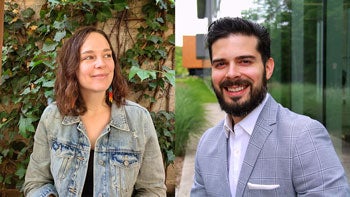Between the proliferation of screens and the pressures of the daily grind, it can feel like getting a good night's sleep is harder than ever.
Yet, despite widespread concern that modern life is robbing us of rest, new research from the University of Toronto is telling a different bedtime story: People in industrial societies are actually sleeping longer - and more efficiently - than those living in small, off-grid communities.

David Samson, an associate professor of evolutionary anthropology at U of T Mississauga and director of the Sleep and Human Evolution Lab , and PhD candidate Leela McKinnon say the findings suggest the real issue may not be how much sleep we're getting, but how our hyperconnected lives are throwing off our body clocks -and what we can do to reset them.
"What we can take away from this study is that people have a lot more control over their sleep quality than they might realize," McKinnon says.
Published in the Royal Society's biology journal, the large-scale analysis of global sleep habits drew on data from 54 studies published between 1967 and 2022. Together, the studies covered more than 5,000 adults from a wide range of populations - from tech-turbocharged metropolises to rural communities with minimal infrastructure.
The data were collected using polysomnography, a clinical method that tracks brain and body activity during sleep, and actigraphy, a wrist-worn device that monitors sleep through movement. The analysis explored two key questions: How much sleep are people getting across different societies? And how closely does that sleep track with the body's natural rhythms?
The results were eye-opening. People in industrial societies averaged 7.1 hours of shut-eye per night, compared to 6.4 hours in non-industrial societies. They also had higher sleep efficiency, spending 14 per cent more of their time in bed actually asleep.
The researchers say these findings challenge the sleep restriction epidemic hypothesis, which posits that work demands and digital distractions are cutting into our sleep.
But sleep duration isn't the whole story. The second part of the study looked at data from 866 individuals to assess circadian rhythms, which reflect how well our body clocks stay in sync with the 24-hour cycle of light and dark.
The analysis showed that people in non-industrial societies - who tended to have limited access to electricity and greater exposure to natural light - had stronger, more stable circadian rhythms than those in industrial settings, where internal clocks were more fragmented and misaligned with environmental cues.
These biological rhythms help regulate systems that affect our mood, metabolism and heart health. But in industrial societies, modern comforts like artificial lighting and screens have disrupted that delicate timing, Samson says.
"We know that the kind of environment we live in in North America is conducive to deep, long sleep," he says. "[But] we have so overcompensated in the direction of comfort and safety that we've actually reduced the capacity of our bodies to stay strong and healthy, because we are out of sync with our natural environment."
Samson says the findings point to simple ways we can get our body clocks back on track. Getting regular exposure to sunlight, especially early in the day, can help regulate circadian rhythms, he says. Meanwhile, cutting back on screens in the evening reduces blue light exposure that suppresses melatonin, the hormone that signals when it's time to sleep.
McKinnon says such changes, if applied consistently, go a long way towards helping us sleep more soundly at night and feel more energized during the day.
"It's amazing how much [these two changes] can help to keep a regular sleep schedule: spend more time outside and use our devices more judiciously."






